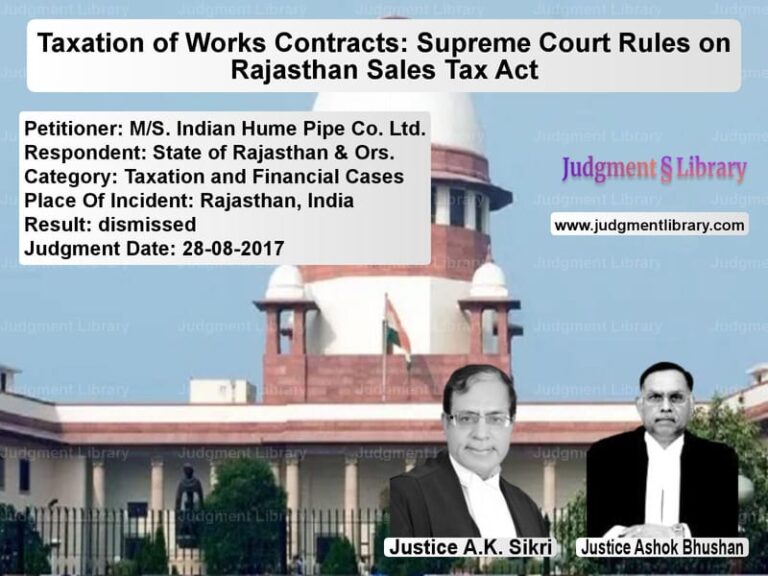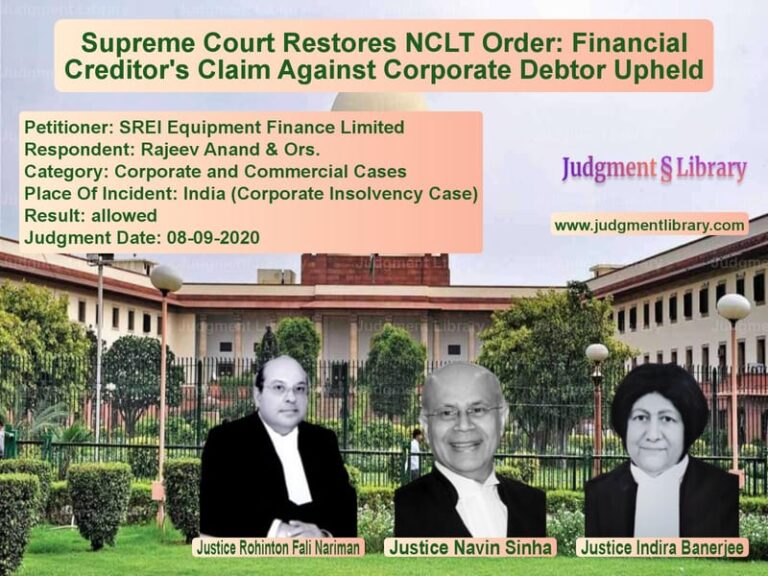Customs Valuation Dispute: Supreme Court Upholds Transaction Value for Imported Goods
The case of Commissioner of Central Excise and Service Tax, Noida v. M/s. Sanjivani Non-Ferrous Trading Pvt. Ltd. dealt with a crucial dispute regarding the assessment of the transaction value of imported aluminum scrap. The Supreme Court upheld the ruling of the Customs, Excise, and Service Tax Appellate Tribunal (CESTAT), which rejected the revenue department’s enhancement of the assessable value and restored the transaction value declared by the importer.
Background of the Case
The dispute arose from the import of various grades of aluminum scrap by M/s. Sanjivani Non-Ferrous Trading Pvt. Ltd. between August 27, 2013, and December 29, 2014. The importer filed 843 Bills of Entry with declared transaction values for customs duty assessment. However, the Assessing Officer rejected these values, citing them as too low, and reassessed them at higher values based on the alleged grade of scrap and the presence of other metals.
The importer challenged this decision before the High Court of Allahabad, which directed the Deputy Commissioner of Customs, Noida, to issue a speaking order. The Deputy Commissioner upheld the higher valuation. The importer then appealed to the Commissioner (Appeals), who dismissed the appeal. The matter was subsequently brought before CESTAT, which ruled in favor of the importer, prompting the revenue department to appeal to the Supreme Court.
Key Issues in the Case
The Supreme Court was asked to consider the following questions:
- Whether the revenue department was justified in rejecting the declared transaction value of the imported aluminum scrap.
- Whether CESTAT erred in setting aside the reassessment order and restoring the declared transaction value.
- Whether the revenue department was required to conduct a proper assessment before enhancing the declared value.
Arguments of the Petitioner (Revenue Department)
The revenue department argued:
- The Assessing Officer had valid reasons to reject the transaction value, as it appeared too low compared to similar imports.
- Section 14 of the Customs Act, 1962, allows rejection of the declared value when it does not reflect the correct transaction value.
- Since CESTAT acknowledged that the Assessing Officer had not examined the available evidence, the proper course was to remand the case for reassessment rather than outrightly accepting the importer’s declared value.
Arguments of the Respondent (Importer)
The importer countered:
- The declared transaction value was the actual price paid for the imported goods and should be accepted under Section 14 of the Customs Act.
- The Assessing Officer failed to provide any substantive evidence to justify the enhanced valuation.
- Customs authorities cannot arbitrarily reject the declared value without proving that the price was not the sole consideration.
- CESTAT correctly restored the declared transaction value, as there was no legal basis for the revenue department’s reassessment.
Supreme Court’s Observations
The Supreme Court thoroughly examined the legal principles governing customs valuation and made several key observations:
1. Transaction Value Under Section 14 of the Customs Act
The Court reaffirmed that Section 14(1) of the Customs Act mandates that the assessable value of imported goods must be based on the transaction value, i.e., the price actually paid or payable for the goods in an arms-length transaction.
It quoted from Eicher Tractors Ltd. v. Commissioner of Customs, Mumbai (2001) 1 SCC 315:
“The assessable value has to be arrived at based on the price which is actually paid unless there is cogent evidence that the price declared is incorrect.”
2. Conditions for Rejection of Declared Value
The Court emphasized that customs authorities could only reject the declared value under specific conditions, such as:
- When the buyer and seller are related, and the price is not the sole consideration.
- When there is evidence of misdeclaration of the price.
- When the transaction is influenced by non-monetary considerations.
Since the revenue department did not establish any of these conditions, the rejection of the declared value was unjustified.
3. Burden of Proof on the Revenue Department
The Court noted that the revenue department had the burden to prove why the declared transaction value was incorrect. In Commissioner of Customs v. South India Television (P) Ltd. (2007) 6 SCC 373, the Court had held:
“If the department seeks to enhance the assessable value, the burden is on them to establish the reason for rejection of the declared value with supporting evidence.”
The Supreme Court ruled that in this case, the revenue department had failed to provide such evidence.
4. The Role of CESTAT
The Court observed that CESTAT correctly applied the legal principles by rejecting the reassessment order. The Tribunal had clearly stated:
“The revenue department did not properly examine the evidence available for enhancement of assessable value. In the absence of such examination, the declared transaction value must be accepted.”
Supreme Court’s Judgment
Based on these observations, the Supreme Court ruled:
- The revenue department had no legal basis to reject the transaction value declared by the importer.
- CESTAT correctly restored the declared value, as the department failed to prove the alleged under-declaration.
- The appeal filed by the revenue department was dismissed, and the importer was entitled to consequential relief.
Impact of the Judgment
This ruling has significant implications for customs valuation and import regulations:
- Reaffirmation of Transaction Value Principle: The judgment strengthens the rule that transaction value must be accepted unless proven otherwise.
- Limits on Arbitrary Valuation Enhancements: Customs authorities cannot arbitrarily enhance the assessable value without substantive evidence.
- Protection for Importers: The decision reinforces legal protections for importers against unjustified increases in customs duty.
- Guidance for Future Disputes: The ruling sets a clear precedent for future cases involving customs valuation disputes.
Conclusion
The Supreme Court’s judgment in Commissioner of Central Excise and Service Tax, Noida v. M/s. Sanjivani Non-Ferrous Trading Pvt. Ltd. is a landmark decision in customs law. It upholds the principle that transaction value should be accepted unless the revenue department provides concrete evidence to justify its rejection. The ruling ensures fairness in customs assessments and protects importers from arbitrary duty enhancements.
Petitioner Name: Commissioner of Central Excise and Service Tax, Noida.Respondent Name: M/s. Sanjivani Non-Ferrous Trading Pvt. Ltd..Judgment By: Justice A.K. Sikri, Justice S. Abdul Nazeer.Place Of Incident: Noida, Uttar Pradesh.Judgment Date: 10-12-2018.
Don’t miss out on the full details! Download the complete judgment in PDF format below and gain valuable insights instantly!
Download Judgment: Commissioner of Cent vs Ms. Sanjivani Non-F Supreme Court of India Judgment Dated 10-12-2018.pdf
Direct Downlaod Judgment: Direct downlaod this Judgment
See all petitions in Tax Refund Disputes
See all petitions in Banking Regulations
See all petitions in Income Tax Disputes
See all petitions in Judgment by A.K. Sikri
See all petitions in Judgment by S. Abdul Nazeer
See all petitions in dismissed
See all petitions in supreme court of India judgments December 2018
See all petitions in 2018 judgments
See all posts in Taxation and Financial Cases Category
See all allowed petitions in Taxation and Financial Cases Category
See all Dismissed petitions in Taxation and Financial Cases Category
See all partially allowed petitions in Taxation and Financial Cases Category







